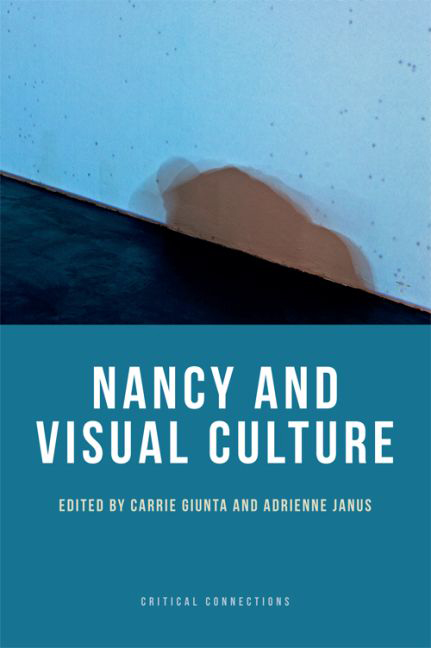Book contents
- Frontmatter
- Contents
- List of illustrations
- Acknowledgements
- Introduction: Jean-Luc Nancy and the Image of Visual Culture
- 1 Cutting and Letting-Be
- 2 Dancing Equality: Image, Imitation and Participation
- 3 A Question of Listening: Nancean Resonance, Return and Relation in Charlie Chaplin
- 4 The Image: Mimesis and Methexis
- 5 On the Threshold: Visual Culture, Invisible Nature
- 6 Pornosophy: Jean-Luc Nancy and the Pornographic Image
- 7 Presentation and Disappearance: Dialogue between Soun-Gui Kim and Jean-Luc Nancy
- 8 Writing in the Place of the Animal
- 9 Together at the Limit: Jean-Luc Nancy, Art and Community
- 10 Turning Around the Written Mark, Opening from a Weight of Thought
- 11 Uncanny Landscapes of Photography: The Partage of Double-Exposure after Jean-Luc Nancy
- Contributors
- Bibliography
- Index
6 - Pornosophy: Jean-Luc Nancy and the Pornographic Image
Published online by Cambridge University Press: 15 September 2017
- Frontmatter
- Contents
- List of illustrations
- Acknowledgements
- Introduction: Jean-Luc Nancy and the Image of Visual Culture
- 1 Cutting and Letting-Be
- 2 Dancing Equality: Image, Imitation and Participation
- 3 A Question of Listening: Nancean Resonance, Return and Relation in Charlie Chaplin
- 4 The Image: Mimesis and Methexis
- 5 On the Threshold: Visual Culture, Invisible Nature
- 6 Pornosophy: Jean-Luc Nancy and the Pornographic Image
- 7 Presentation and Disappearance: Dialogue between Soun-Gui Kim and Jean-Luc Nancy
- 8 Writing in the Place of the Animal
- 9 Together at the Limit: Jean-Luc Nancy, Art and Community
- 10 Turning Around the Written Mark, Opening from a Weight of Thought
- 11 Uncanny Landscapes of Photography: The Partage of Double-Exposure after Jean-Luc Nancy
- Contributors
- Bibliography
- Index
Summary
What happens when a philosopher gets a hard-on? Generally speaking, this is not a subject philosophers often discuss. Moreover, the slang, some might even say obscene expression ‘to get a hardon’ does not properly belong to the idiom of academic research. In place of ‘hard-on’, or the only slightly less offensive ‘erection’, one should probably say something like ‘tumescence of the penis’, presuming for the moment that a hard-on must refer to a penis, which in turn must be part of a male body identifiable as such. Nothing could be less certain. In any case, the boldness and directness of the idiom of ‘getting a hard-on’ should probably be avoided, since its place is rather in pornography or maybe the bedroom. And yet, in apparently complying with such a powerful taboo, one must be able to ask if an opportunity is thereby lost. ‘Male’ philosophers such Georges Bataille, the Marquis de Sade, Friedrich Schlegel and, closer to our time, feminists such as Hélène Cixous and Luce Irigaray have not only reflected on sexuality, they have sought to bear witness to ways in which sexual arousal and desire touch their philosophical thoughts and writing. For this mode of sexualised reflection, Avital Ronell has proposed the term ‘pornosophy’. She introduces it as follows:
Closer to the mores of contemporary writers, Friedrich Schlegel to this day takes beatings from philosophical overlords who continue to press charges against the philosophical pornography machine, the pornosophy, his novel Lucinde indulges. As Paul de Man once drove home, the scandal of Schlegel consists in the crossover of genres, the wonton staging of incompatible codes, and the ensuing contaminations of reciprocally alien formalities, rather than in the build up of any specific or accreditable content. These writers, including, of course, the formidable Marquis de Sade, have tried to take philosophy to bed.
Has anyone in modern philosophy ever attempted to elaborate an ethics or politics of the hard-on? Enduring debates about what is called the gender gap in philosophy departments throughout the world, sexual harassment, not to mention the endless vexations and jokes about the virile comportment of philosophers, and philosophy itself, that have been circulating in the backrooms of the discipline since I don't know when – all of this would support an argument that such an ethics or politics merits at least to be considered.
- Type
- Chapter
- Information
- Nancy and Visual Culture , pp. 109 - 128Publisher: Edinburgh University PressPrint publication year: 2016

